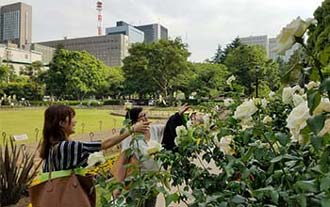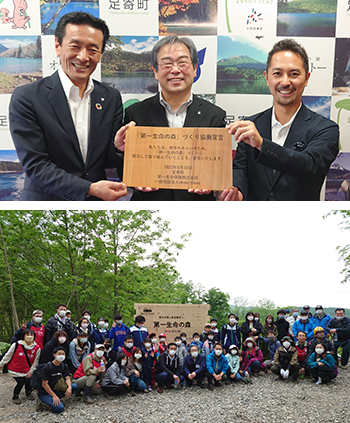Social contribution activities of the Dai-ichi Life Group that contribute to environmental protection and biodiversity conservation
Participation in the Task Force on Nature-related Financial Disclosures (TNFD) Forum

TNFD is an international initiative, conceived at the 2019 World Economic Forum at Davos and officially launched in June 2021, that aims to establish a disclosure framework for nature-related risks.
Dai-ichi Life Holdings endorses the principles of the TNFD and has joined the TNFD Forum in October 2022 to support its activities.
Special sponsorship of "City Green 3 Awards"

The Group's core company, Dai-ichi Life, wants to contribute to improving the quality of life (QOL) of local residents through the creation of green urban environments and communities. Since 1990, we have supported the three urban greening awards (the Green Environmental Plans Award, the Green Cities Award, and the Competition for Specialized Greening Technology). This award will contribute to the realization of the SDGs. We contribute not only to urban development where people and nature coexist, but also to climate change and biodiversity conservation through planting trees.
Tree-planting activities at Dai-ichi Life Forest

Dai-ichi Life Insurance, the core company of the Dai-ichi Life Group, started full-scale creation of "Dai-ichi Life Forest" in Ashoro Town, Hokkaido, on June 11, 2022, with the cooperation of a forest conservation group "more trees. Prior to the tree planting, a "Declaration of Cooperation Ceremony" was held, where Dai-ichi Life Insurance, Ashoro Town, and more trees declared that they would work together to create the "Dai-ichi Life Forest" for the future of the earth. About 70 people, mostly elementary and junior high school students and their families from Ashoro-machi, participated in the tree-planting event. At this event, participants planted about 1 hectare of Mizunara oak saplings. Participants commented that they were looking forward to seeing the saplings grow large and become a forest rich in nature (elementary school student), and that they wanted to do everything they could for the future of their children and the earth (male in his 40s). After the event, a woodworking workshop (spoon making) using wood from Hokkaido was held to promote interaction among the participants. In addition to the creation of the "Dai-ichi Life Forest," Dai-ichi Life will also purchase CO2 offset credits generated from the forests of four towns in Hokkaido, including Ashoro Town, to promote forest conservation and biodiversity preservation.
Reduction of plastic waste at dl.café

In June 2019, we introduced paper straws at "dl.café", a coffee shop at Dai-ichi Life headquarters operated by Dai-ichi Life Challenged in order to reduce plastic waste, which has become a global problem in recent years. We regard the protection of the global environment and the construction of a sound environment friendly material-recycle society as a corporate social responsibility.
Going forward, the entire group will work together to protect and conserve the environment and reduce the burden on the environment.
Promotion of investment and financing to ensure the sustainability of natural capital
At Dai-ichi Life, the core company of the group, we are working to create a positive impact on society by investing in and financing assets that contribute to solving social issues, such as securing water resources.
| Investment theme | Major sustainability-themed investment cases |
|---|---|

Clean Water and Sanitation |
|

Responsible Consumption and Production |
|

Life Below Water |
|

Life on Land |
Please refer to Sustainability Report for details of Climate Change and Natural Capital Initiatives.